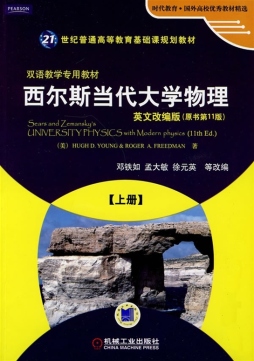西尔斯当代大学物理
出版社:机械工业出版社
年代:2009
定价:34.0
书籍简介:
本书参照教育部《理工科大学物理课程教学基本要求》改编。内容包括力学、热学、电磁学等。本教材为高等学校理工科各专业学生的大学物理双语教学专用教材,也可供相关技术人员参考。
书籍目录:
Preface
1 PHYSICAL QUANTITIES AND VECTORS
1.1 The Nature of Physics
1.2 Idealized Models
1.3 Standards and Units
1.4 Uncertainty and Significant Figures
1.5 Vectors and Scalars
1.6 Vector Algebra
1.7 Unit Vectors and Component
Expression
Answer to Chapter Opening Question
Exercises
2 KINEMATICS
2.1 Particle Kinematics
2.2 Position Vector and Displacement
2.3 Velocity and Acceleration
2.4 Rectilinear Motion
2.5 Two Fundamental Problems in Kinematics
2.6 Relative Motion
Answer to Chapter Opening Question
Exercises
3 DYNAMICS
3.1 Particle Dynamics
3.2 Newton s Laws
3.3 Understanding Forces
3.4 Dynamics of Circular Motion
3.5 Non-inertial Frame and Inertial Forces
Answer to Chapter Opening Question
Exercises
4 WORK AND ENERGY
4.1 Kinetic Energy and Work
4.2 Calculating the Work
4.3 Path Independence of Conservative Forces
4.4 Potential Energy
4.5 Conservation of Mechanical Energy
4.6 Find the Conservative Force from Potential Energy
Answer to Chapter Opening Question
Exercises
5 MOMENTUM AND IMPULSE
5.1 Definition of Momentum
5.2 Conservation of Momentum
5.3 Impulse
5.4 Collisions
5.5 Center of Mass
5.6 Rocket Propulsion
5.7 Problem-Solving Strategy ISEE
Answer to Chapter Opening Question
Exercises
6 ROTATION OF RIGID BODIES
6.1 Angular Velocity and Acceleration
6.2 Rotation with Constant Angular Acceleration
6.3 Relating Linear and Angular Kinematics
6.4 Energy in Rotational Motion
6.5 Parallel-Axis Theorem
6.6 Moment of Inertia Calculations
Answer to Chapter Opening Question
Answers to Test Your Understanding
Questions
Exercises
7 DYNAMICS OF ROTATIONAL MOTION
7.1 Torque
7.2 Torque and Angular Acceleration fora Rigid Body
7.3 Rigid-Body Rotation About a MovingAxis
7.4 Work and Power in RotationalMotion
7.5 Angular Momentum
7.6 Conservation of Angular Momentum
7.7 Gyroscopes and Precession
Answer to Chapter Opening Question
Answers to Test Your Understanding
Questions
Exercises
8 PERIODIC MOTION
8.1 Describing Oscillation
8.2 Simple Harmonic Motion
8.3 Energy in Simple Harmonic Motion
8.4 Applications of Simple Harmonic Motion
8.5 The Simple Pendulum
8.6 The Physical Pendulum
8.7 Damped Oscillations
8.8 Forced Oscillations and Resonance
Answer to Chapter Opening Question
Answers to Test Your Understanding
Questions
Exercises
9 MECHANICAL WAVES
9.1 Types of Mechanical Waves
9.2 Periodic Waves
9.3 Mathematical Description of a Wave
9.4 Energy in Wave Motion
9.5 Wave Interference,Boundary Conditions and Superposition
9.6 Standing Waves on a String
9.7 Normal Modes of a String
9.8 Beats
9.9 The Doppler Effect
Answer to Chapter Opening Question
Answers to Test Your Understanding
Questions
Exercises
10 TEMPERATURE AND HEAT
10.1 Temperature and Thermal Equilibrium
10.2 Thermometers and Temperature Scales
10.3 Gas Thermometers and the Kelvin Scale
10.4 Quantity of Heat
10.5 Calorimetry and Phase Changes
10.6 Mechanisms of Heat Transfer
Answer to Chapter Opening Question
Answers to Test Your Understanding
Questions
Exercises
11 THERMAL PROPERTIES OF MATTER
11.1 Equations of State
11.2 Molecular Properties of Matter
11.3 Kinetic-Molecular Model of an Ideal Gas
11.4 Heat Capacities
11.5 Molecular Speeds
Answer to Chapter Opening Question
Answers to Test Your Understanding
Oestions
Exercises
12 THE FIRST LAW OF THERMODYNAMICS
12.1 Thermodynamic Systems
12.2 Work Done During Volume Changes
12.3 Paths Between Thermodynamic States
12.4 Internal Enerzv and the First Law of Thermodynamics
12.5 Kinds of Thermodynamic Processes
12.6 Internal Energy of an Ideal Gas
12.7 Heat Capacities of an Ideal Gas
12.8 Adiabatic Processes for an Ideal Gas
Answer to Chapter Opening Question
Answers to Test Your Understanding
Questions
Exercises
13 THE SECOND LAW OF THERMODYNAMICS
13.1 Directions of Thermodynamic Processes
13.2 Heat Engines
13.3 Refrigerators
13.4 The Second Law of Thermodynamics
13.5 The Carnot Cycle
13.6 Entropy
13.7 Microscopic Interpretation of Entropy
Answer to Chapter Opening Question
Answers to Test Your Understanding
Exercises
14 ELECTRIC CHARGE AND ELECTRIC FIELD
14.1 Electric Charge
14.2 Conductors,Insulators and Induced Charges
14.3 Coulomb s Law
14.4 Electric Field and Electric Forces
14.5 Electric Field Calculations
14.6 Electric Field Lines
14.7 Electric Dipoles
Answer to Chapter Opening Question
Answers to Test Your Understanding
Questions
Exercises
15 GAUSS S LAW
15.1 Charge and Electric Flux
15.2 Calculating Electric Flux
15.3 Gauss s Law
15.4 Applications of Gauss s Law
15.5 Charges on Conductors
Answer to Chapter Opening Question
Answers to Test Your Understanding
Questions
Exercises
16 ELECTRIC POTENTIAL
16.1 Electric Potential Energy
16.2 Electric Potential
16.3 Calculating Electric Potential
16.4 Equipotential Surfaces
16.5 Potential Gradient
Answer to Chapter Opening Question
Answers to Test Your Understanding
Questions
Exercises
17 CAPACITANCE AND DIELECTRICS
17. 1 Capacitors and Capacitance
17.2 Energy Storage in Capacitors and Electric-Field Energy
17.3 Dielectrics
17.4 Molecular Model of Induced Charge
17.5 Gauss s Law In Dielectrics
Answer to Chapter Opening Question
Answers to Test Your Understanding
Questions
Exercises
18 CURRENT, RESISTANCE AND ELECTROMOTIVE FORCE
18.1 Current
18.2 Resistivity
18.3 Resistance
18.4 Electromotive Force and Internal Resistance
18.5 Theory of Metallic Conduction
Answer to Chapter Opening Question
Answers to Test Your Understanding
Questions
Exercises
APPENDICES
Appendix A The International System of Units
Appendix B Useful Mathematical Relations
Appendix C The Greek Alphabet
Appendix D Periodic Table of the Elements
Appendix E Unit Conversion Factors
Appendix F Numerical Constants
Appendix G Answers to Exercises
教学支持信息表(填写本表,获取本书教辅资源)
内容摘要:
本英文改编教材的原书——《西尔斯物理学》是几代编著者长达半个多世纪物理教育探索与创新的产物,其许多可圈可点的特色在美国乃至世界其他国家,影响了一代又一代的大学师生,是当今世界发行量最大的主流教材之一。
本教材分上下两册。《西尔斯当代大学物理(上册·英文改编版)(原书第11版)》是下册,主要内容有电磁学、波动光学、近代物理学等。
《西尔斯当代大学物理(上册·英文改编版)(原书第11版)》既充分体现了原书的特色,又在适合我国国情方面有了新的特点,主要表现在:对原书取舍得当,篇幅适当,教材内容覆盖了教育部最新教学基本要求建议的75个A类知识点和部分B类知识点;教材95%以上是原书的文字,体现了原书教学理念的精华,整个教材体系具有更好的系统性和完整性;内容生动、丰富,图文并茂,举例鲜活,趣味性强,联系实际密切,强调概念理解,注重能力培养;每章的问题引入法、正文探索式的叙述法以及每节的思考题检测法等多种教学方法并用,将有效调动学生学习的积极性,提高学生学习的效能;所有例题都采用四步解题法:审题(Identify)、破题(Set up)、求解(Excute)和讨论(EvaIuate),这种规范、科学的解题方式十分有利于学生形成思维清晰、表述准确、方法明确的解题习惯,并能逐步获得较强的解决实际问题的能力;英语行文规范、流畅,原汁原味,代表了当前科技英语文献的风格,是我国学生学习英文科技写作的极好范本。
本教材为高等学校理工科各专业学生的大学物理双语教学专用教材。由于与国内教材有很强的相关对应性,故对于希望了解物理知识英文表述的非双语教学的师生及其他科技工作者,《西尔斯当代大学物理(上册·英文改编版)(原书第11版)》也是一本十分有益的参考书。
编辑推荐:
《西尔斯当代大学物理(上册·英文改编版)(原书第11版)》配有丰富的教辅资源,索取事宜见书后的“教学支持信息表”。
书籍规格:
| 书籍详细信息 | |||
| 书名 | 西尔斯当代大学物理站内查询相似图书 | ||
| 9787111275336 如需购买下载《西尔斯当代大学物理》pdf扫描版电子书或查询更多相关信息,请直接复制isbn,搜索即可全网搜索该ISBN | |||
| 出版地 | 北京 | 出版单位 | 机械工业出版社 |
| 版次 | 1版 | 印次 | 1 |
| 定价(元) | 34.0 | 语种 | 英文 |
| 尺寸 | 26 | 装帧 | 平装 |
| 页数 | 320 | 印数 | 3000 |
书籍信息归属:
西尔斯当代大学物理是机械工业出版社于2009.07出版的中图分类号为 O4 的主题关于 物理学-高等学校-教材-英文 的书籍。
- 西尔斯当代大学物理2009.07
(美) 扬, (美) 弗里德曼, 著
- 西尔斯当代大学物理2010.12
(美) 扬 (Young,H.D.) , (美) 弗里德曼 (Freedman,R.A.) , 著
- 西尔斯当代大学物理2018.9
(美) 休·D.杨 (Hugh D. Young) , (美) 罗杰·A.弗里德曼 (Roger A. Freedman) , (美) A.路易斯·福特 (A. Lewis Ford) , 著
- 西尔斯当代大学物理2018.10
(美) 休·D.杨 (Hugh D.Young) , (美) 罗杰·A. 弗里德曼 (Roger A. Freedman) , (美) A.路易斯·福特 (A. Lewis Ford) , 著
- 当代大学物理2019.12
吴平, 邱红梅, 徐美, 主编
- 大学物理2006.08
李增智, 王颖, 杨久敏, 编著
- 大学物理2004.
(美) 赛维尔 (Serway) , (美) 佛恩 (Faughn) , 著
- 大学物理2006.08
仲海洋, 主编
- 大学物理2008.12
张智, 编著
